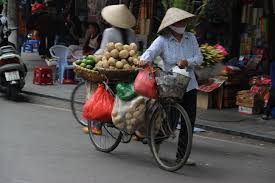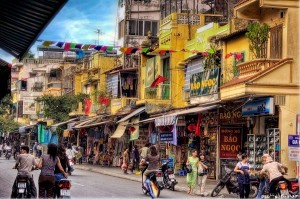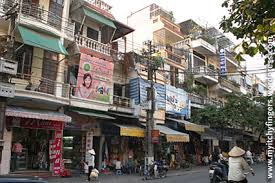
Newsnet | Mar 13, 2015
As Western society anguishes over human rights and freedom of speech in the wake of the Charlie Hebdo murders, government critics in Vietnam enjoy no such luxury. Many are persecuted and imprisoned with little prospect of a fair trial.
Hanoi-based Scottish journalist Marianne Brownfiled this exclusive audio report for Newsnet.scot
Below is a transcription of Marianne’s report, which can be heard by clicking on the audio file above.
For some families in Vietnam #JeNeSuisPas is not an option.
Whether it’s via the hashtag #JeSuisCharlie or #JeNeSuisPasCharlie, most people have welcomed the widespread dissection of “freedom of expression” the media has provided following the killings in Paris, with many discussing what the right to hold an opinion and impart ideas means in western society.
Here in Vietnam, for some families “je ne suis pas” is not an option. This is the case for the sons of four jailed activists who have chosen to stand by their parents and campaign for freedom of speech, even though by doing so, they become targets for police harassment.
Watching the scooters and cars clog the road outside a popular mall in Hanoi, it’s difficult to imagine that just a few decades ago this city was struggling to survive in the wake of decades of devastating war.
ONE-PARTY STATE
While the economy has opened up, the political system has not. Vietnam is a one-party state; one of the few remaining Communist countries in the world.
Around 40 per cent of Vietnam’s 90 million people have internet access. Many people have turned to political blogs and social media as an alternative to the official press, which is rife with self censorship.
Attempts to stunt the rise of political blogging and online activism have resulted in lengthy jail terms and police harassment.
The government says no one is jailed for peacefully expressing their opinions.
Nguyen Tri Dung is the son of one of the country’s best known bloggers, Nguyen Van Hai, who wrote about social issues under his pen name Điếu Cày – which means “peasant’s pipe” in Vietnamese.
“When I was young we were learning that it could be bad if you are listening to political information from the outside but not the government. That’s why I don’t care so much about politics when I was young,” says Dung.
“Every time I went home from the history lesson and I talk about history at home, my father would talk about the difference and what is the truth in that history. That is the first time I had an impression about political problems, that is history is not real.”
“ANTI STATE ACTIVITIES”
In 2012 Hai was jailed for 12 years for “conducting propaganda against the state”, a charge condemned as politically motivated. Communist Party newspaper Nhan Dan quoted the People’s Procuracy as saying his “anti-State activities” were organised with help from “Vietnamese reactionary organisations in exile and hostile forces.”
But in October last year Hai was taken from jail and flown to the United States. The Ministry of Foreign Affairs said he was released for humanitarian reasons.
His family say if he comes home he will be sent back to jail.
While Hai is free, his family back in Vietnam are not.
Adds Dung: “I don’t have any charge or criminal, but any time they want me to stay at home they do it. They surround me with a human fence and put me back inside. They say they need me to stay inside the house.
“For my work, I already found some, but one way or another they come and ask them to let me go.”
These tactics started as early as 2008 when Dung was still at high school and his father was first arrested.
He says on the day of his final exam, police came to his home and took him to the station.
Says Dung: “They put me in a room and locked it, and only released me when the night came.
“At first I blamed my father for what he was doing. We are not rich but we have more than enough. What my father was doing and what my family had to take that was a really big sacrifice to make. I wondered what he was doing it for.
“After that a lot of harassment came from the government. As this happened I thought my father was right. I try to help other people like me and fight for my father.”
Dung’s story is not unique.
Tran Bui Trung’s mother is a well known rights activist currently serving a three-year prison sentence for causing “public disorder”.
Fifty-year-old Bui Thi Minh Hang was a colourful participant in protests against perceived Chinese aggression in the South China Sea. She was also very prolific on Facebook, sharing information about human rights cases across the country with thousands of followers.
Trung has travelled to the US and the Philippines to campaign for his mother’s release.
Tran Bui Trung says: “I knew a little about human rights before, but after my mother became a human rights activist I learnt more about it. I started to pay more attention to it.
“After a bit of time I wanted to study human rights and civil society because my friends are human rights activists and I think human rights issues in Vietnam are not well known in the world. I want to help develop civil society in Vietnam.”
Not all families choose to take this path, but the support network provided by the activist community provides a valuable emotional prop.
EVICTION PROTEST
Thirty-one-year-old Trinh Ba Phuong’s parents did not campaign for freedom of speech. They helped organise a protest against an eviction in Duong Noi village outside Hanoi. The amount of compensation was too low, they said, and they didn’t want to lose their livelihoods. The problem of land rights plagues many countries across Southeast Asia.
A video claiming to be of the protest shows men in police uniforms and security armbands chasing a group of people in conical hats and beating them with sticks.
Phuong’s parents were arrested at the scene and later jailed for 12 and 20 months for disturbing public order.
“At the first trial they stopped us from attending the trial. We shouted that we thought it was not a just trial. Around 100 policemen came out and beat us. My younger brother was beaten unconscious,” says Phuong.
Despite the potential for more police harassment, the brothers say they will to continue campaigning for their parents’ release, and have become established members of the activist community.
Dung concludes: “Some people who have harassment, they are ok with that, they live on and will not become an activist. But some people their house is taken away or they have family members in jail so they become activists like me.”
Dieu Cay’s son Dung has a baby boy, and his wife is pregnant with their second child. He says parenthood helped him understand his own father’s motives. He says the feeling of empathy he shares with other sons and daughters of activists will only grow in the face of intimidation.
Height Insoles: Hi, I do believe this is an excellent site. I stumbledupon …
http://fishinglovers.net: Appreciate you sharing, great post.Thanks Again. Keep writi…
Achilles Pain causes: Every weekend i used to pay a quick visit this site, as i w…






March 16, 2015
Exclusive from Hanoi: where freedom of speech is like gold-dust
by Nhan Quyen • [Human Rights]
Here in Vietnam, for some families “je ne suis pas” is not an option. This is the case for the sons of four jailed activists who have chosen to stand by their parents and campaign for freedom of speech, even though by doing so, they become targets for police harassment.
Watching the scooters and cars clog the road outside a popular mall in Hanoi, it’s difficult to imagine that just a few decades ago this city was struggling to survive in the wake of decades of devastating war.
Newsnet | Mar 13, 2015
As Western society anguishes over human rights and freedom of speech in the wake of the Charlie Hebdo murders, government critics in Vietnam enjoy no such luxury. Many are persecuted and imprisoned with little prospect of a fair trial.
Hanoi-based Scottish journalist Marianne Brownfiled this exclusive audio report for Newsnet.scot
Below is a transcription of Marianne’s report, which can be heard by clicking on the audio file above.
For some families in Vietnam #JeNeSuisPas is not an option.
Whether it’s via the hashtag #JeSuisCharlie or #JeNeSuisPasCharlie, most people have welcomed the widespread dissection of “freedom of expression” the media has provided following the killings in Paris, with many discussing what the right to hold an opinion and impart ideas means in western society.
Here in Vietnam, for some families “je ne suis pas” is not an option. This is the case for the sons of four jailed activists who have chosen to stand by their parents and campaign for freedom of speech, even though by doing so, they become targets for police harassment.
Watching the scooters and cars clog the road outside a popular mall in Hanoi, it’s difficult to imagine that just a few decades ago this city was struggling to survive in the wake of decades of devastating war.
ONE-PARTY STATE
While the economy has opened up, the political system has not. Vietnam is a one-party state; one of the few remaining Communist countries in the world.
Around 40 per cent of Vietnam’s 90 million people have internet access. Many people have turned to political blogs and social media as an alternative to the official press, which is rife with self censorship.
Attempts to stunt the rise of political blogging and online activism have resulted in lengthy jail terms and police harassment.
The government says no one is jailed for peacefully expressing their opinions.
Nguyen Tri Dung is the son of one of the country’s best known bloggers, Nguyen Van Hai, who wrote about social issues under his pen name Điếu Cày – which means “peasant’s pipe” in Vietnamese.
“When I was young we were learning that it could be bad if you are listening to political information from the outside but not the government. That’s why I don’t care so much about politics when I was young,” says Dung.
“Every time I went home from the history lesson and I talk about history at home, my father would talk about the difference and what is the truth in that history. That is the first time I had an impression about political problems, that is history is not real.”
“ANTI STATE ACTIVITIES”
In 2012 Hai was jailed for 12 years for “conducting propaganda against the state”, a charge condemned as politically motivated. Communist Party newspaper Nhan Dan quoted the People’s Procuracy as saying his “anti-State activities” were organised with help from “Vietnamese reactionary organisations in exile and hostile forces.”
But in October last year Hai was taken from jail and flown to the United States. The Ministry of Foreign Affairs said he was released for humanitarian reasons.
His family say if he comes home he will be sent back to jail.
While Hai is free, his family back in Vietnam are not.
Adds Dung: “I don’t have any charge or criminal, but any time they want me to stay at home they do it. They surround me with a human fence and put me back inside. They say they need me to stay inside the house.
“For my work, I already found some, but one way or another they come and ask them to let me go.”
These tactics started as early as 2008 when Dung was still at high school and his father was first arrested.
He says on the day of his final exam, police came to his home and took him to the station.
Says Dung: “They put me in a room and locked it, and only released me when the night came.
“At first I blamed my father for what he was doing. We are not rich but we have more than enough. What my father was doing and what my family had to take that was a really big sacrifice to make. I wondered what he was doing it for.
“After that a lot of harassment came from the government. As this happened I thought my father was right. I try to help other people like me and fight for my father.”
Dung’s story is not unique.
Tran Bui Trung’s mother is a well known rights activist currently serving a three-year prison sentence for causing “public disorder”.
Fifty-year-old Bui Thi Minh Hang was a colourful participant in protests against perceived Chinese aggression in the South China Sea. She was also very prolific on Facebook, sharing information about human rights cases across the country with thousands of followers.
Trung has travelled to the US and the Philippines to campaign for his mother’s release.
Tran Bui Trung says: “I knew a little about human rights before, but after my mother became a human rights activist I learnt more about it. I started to pay more attention to it.
“After a bit of time I wanted to study human rights and civil society because my friends are human rights activists and I think human rights issues in Vietnam are not well known in the world. I want to help develop civil society in Vietnam.”
Not all families choose to take this path, but the support network provided by the activist community provides a valuable emotional prop.
EVICTION PROTEST
Thirty-one-year-old Trinh Ba Phuong’s parents did not campaign for freedom of speech. They helped organise a protest against an eviction in Duong Noi village outside Hanoi. The amount of compensation was too low, they said, and they didn’t want to lose their livelihoods. The problem of land rights plagues many countries across Southeast Asia.
A video claiming to be of the protest shows men in police uniforms and security armbands chasing a group of people in conical hats and beating them with sticks.
Phuong’s parents were arrested at the scene and later jailed for 12 and 20 months for disturbing public order.
“At the first trial they stopped us from attending the trial. We shouted that we thought it was not a just trial. Around 100 policemen came out and beat us. My younger brother was beaten unconscious,” says Phuong.
Despite the potential for more police harassment, the brothers say they will to continue campaigning for their parents’ release, and have become established members of the activist community.
Dung concludes: “Some people who have harassment, they are ok with that, they live on and will not become an activist. But some people their house is taken away or they have family members in jail so they become activists like me.”
Dieu Cay’s son Dung has a baby boy, and his wife is pregnant with their second child. He says parenthood helped him understand his own father’s motives. He says the feeling of empathy he shares with other sons and daughters of activists will only grow in the face of intimidation.